- Home
- Michelle Hodkin
The Evolution of Mara Dyer Page 27
The Evolution of Mara Dyer Read online
Page 27
Blood filled my mouth and silent sobs wracked my chest. Water stretched out in front of us, black and endless. We were at the end of a dock. I turned my head to try and find anything that would give me a clue as to where I was—a sign, something—but my vision swam. From the pain? From tears?
Yes, from tears. When they cleared a little, I saw that the dock veered off to our right in a narrow path toward a grouping of blurry, faraway boats.
But no people. No one.
Jude gripped my head hard in one of his hands, palming it like a basketball. He looked down into my eyes. “You’re not motivated enough.”
I had no idea if Noah could see this. I remembered that it wasn’t just pain that made him see; there was something else. But we never figured out what.
As I spat blood out onto the dock, Jude smacked me. Not hard enough to leave a bruise, but hard enough to sting. “Do not. Do not fuck everything up. You will kill your family, Mara.” He leaned down. “Look at me and tell me I’m lying.”
See me, I begged silently. Help me help me help me help me help me help me help me help me.
“Okay,” I said out loud. “Okay, I’ll do it. I’ll do what you want.”
“Just like that?”
“Yes.”
“If you try to run, don’t forget I have the key to your house.”
“I won’t,” I whispered.
“And I could always cut the brakes on Daniel’s car. Or your parents’.”
I couldn’t breathe. A sob escaped from my throat. I was beyond terrified for them. Beyond reason.
“You control whether they get hurt, you understand?”
“Yes,” I said. He gripped my head harder. “Yes,” I moaned.
I could do anything for them, as long as they would be okay. Even this. “I’ll do it.”
Jude sliced the duct tape from my feet and my wrists. He held me by the waistband of my jeans, just the way he used to.
“Give me your hand.”
My thoughts were a roar. I could barely stand. His blade touched the inside of my wrists, tracing a vein. Then it bit into my skin. I cried out.
“Quiet.”
The blood welled and flowed and the coppery scent made my stomach roil. He drew a horizontal line of blood along my wrist, not deep. Then handed me the blade.
“Cut deeper, exactly where I cut. Then your other hand. Don’t forget what I’ll do to Joseph.”
But the line was horizontal.
Not vertical.
Not fatal.
My heart soared for all of a second.
Until I looked back at Jude and realized—
He knew.
53
JUDE DIDN’T WANT TO KILL ME. HE WANTED something else.
Something I couldn’t imagine as I freed the blood from my body, the metallic smell mingling with the salt of the water beneath us, around us, in front of us. Jude stood in front of me, holding my forearms steady as I cut, holding me up. I could not look away from the deepening gashes on my wrists. I was shaking and weak and I let out a low whimper.
“Hello?”
My head snapped up at the same time as Jude’s. My vision blurred—from dizziness, now, not tears—but a lighter shape approached us.
I tried to scream but nothing came out. I was weak and scared and I could barely see and I couldn’t even cry out for help.
Jude let go of one arm and took my face in one large hand. “Don’t even think about it.” He took the blade from me, hid it, and shifted himself so that he stood between me and the voice.
“What’s going on over here?”
The man’s voice was getting louder. Closer. I heard rushed footsteps clap on the wood to my right.
“Everything’s fine,” Jude said calmly.
Clap clap. “Do you need—”
A pause. A gasp. “Oh my God,” the stranger said.
“Everything’s under control,” Jude said, turning on the full force of his charm. He was transformed—I could hear it. If I didn’t know about the rot inside, it would have reminded me why I was attracted to him in the first place.
The man’s voice changed—imbued with authority.
“Did you call an ambulance?”
I tried to speak, to form words, but I had no voice.
“They’re on their way,” Jude said.
My vision cleared a bit as more tears fell. The man reached for something at his hip. “I can have them here in minutes. Cop,” he said.
And then something shifted beneath Jude’s expression. He withdrew the box cutter and my mind roared with terror. The cop had just turned on his radio when Jude flicked the blade open.
The man’s eyes widened. “What are you—”
Jude was going to filet him open. He twisted the box cutter in his hand just as the cop lunged for it.
And then Jude stabbed himself in the side.
I couldn’t process what I was seeing.
Neither could the cop. He wrested the box cutter from Jude’s hand.
“What in the hell—what’s wrong with you?”
Jude fell to his knees, wincing. The cop turned on the radio. “Dispatch, send backup to—”
But the man dropped the radio before he could finish his sentence. An expression of exquisite pain swallowed his confusion. Then he dropped Jude’s box cutter.
Just a few feet away.
I slumped down and crawled toward it because I was too weak or too scared to stand. Pain chewed through my nerves. My vision was edged in black and red. I crawled anyway.
“Don’t . . . bother,” Jude wheezed. He just knelt there, half bent, staring down, his head heavy and his arms limp.
I moved toward him even though everything in me was utterly repelled. I wanted to stop. I kept going. There was groaning—but it wasn’t mine or Jude’s. It was the man, the cop. I couldn’t see him or hear what he was saying or see what was happening. I had one thing on my mind and that was the blade. I reached for it but my muscles weren’t under my control; they shook and I was weak and when my fingers nudged the plastic handle, it fell through the slats of the dock.
It was over.
I was done. My legs and shoulders collapsed and I couldn’t move myself up or anywhere. My eyes were open still and I was still conscious but there was so much pain I wished I wasn’t.
I felt the vibration of a body hitting the dock. It was the cop; I could see him out of my peripheral vision. His eyes were open. Glassy. His breathing was shallow. I heard a tinny voice somewhere to my left. His radio? The only other sound was the water beneath me. The wood was rough against my cheek. I looked down. The water slapped the pylons as the tide slowly came in. It was louder than I would have expected. The moonlight lit the surface of the water. Peaceful.
But then I noticed shapes down there. The shapes, the things, were slapping wetly against the pylons. It wasn’t just the waves.
In a burst of focus before I lost consciousness, I realized that the water wasn’t empty.
It was filled with hundreds of dead and dying fish.
54
TIME DIDN’T EXIST FOR ME ANYMORE. IT could have been seconds or years before I heard another sound.
Beep.
I tried to open my eyes, but the world was bleached of color. Someone had scraped it all away.
Hiss.
“It’s so much more fun when you fight.”
Jude’s voice in my ear. I tried to kick out but I was tangled in something. Caught and helpless, still.
“She’s waking up.” A new voice, strange and foggy and unfamiliar. I tried to speak but gagged instead.
Footsteps approached rapidly. “Shh, now. Just relax.” A hand on my shoulder, heavy and somehow reassuring.
My eyes flew open and light seared my vision. I closed them for a minute, or maybe five. Then tried again.
A woman leaned over me, blurred at the edges, not looking in my eyes. I caught the underside of her jaw, her neck, and her large chest as she reached over me.
“Who are
you?” I asked hoarsely, in a voice that didn’t sound like my own.
I thought I caught a smile. “Name’s Joan, sweetie.”
“Wait—is she—Mara, oh God, Mara, are you awake, honey?”
My mother’s voice rushed in, plunging me in warmth. Something clawed and tore at my chest and it was hard to breathe—then I realized it was a sob. I was crying.
“Oh, honey.” Her hands on me, delicate but solid.
I tried to focus. It was like looking at the world through smudged glass, but I finally, finally saw where I was.
Industrial ceiling tile. Florescent overhead lights. Machines.
The hospital.
The second I thought it, more feelings announced themselves; the tube under my nose. The pressure in my hands, my arms, where more tubes branched out from my skin. I wanted to rip them out and scream but everything was so tight; my chest, my arms, everything. I couldn’t move.
“Why can’t I move?” I asked. I looked down at my body, which was covered completely by a scratchy-looking blanket.
My mother appeared in my view. “It’s to keep you safe, baby.”
“From what?”
My mother glanced up at the ceiling, searching for words. “You don’t remember,” she said, as if to herself.
I remembered Jude taking me from my room and bringing me to a dock to open my veins. I remembered him threatening to kill my family if I didn’t obey.
My mother withdrew something from her pocket then. It was a piece of paper, folded very small; she opened it in front of me. “You left this in your room before you took Daniel’s car,” she said, then showed me the piece of paper. “It was in your journal.”
The journal I didn’t remember keeping. A page of words I didn’t remember writing:
Help me help me help me help me
My mother’s face was broken. She was ashen and drawn and she looked like she’d been crying for a hundred years. “You slit your wrists, Mara,” she said, and choked back a sob. “You slit your wrists.”
“No,” I shook my head fiercely. “You don’t understand.” I tried to sit up and move but I couldn’t. I was still trapped, which poisoned me with panic. “I want to sit up,” I said with desperation.
My mother nodded and the woman I didn’t know—Joan, a nurse, apparently—came over and pressed a button, elevating the bed. I wanted to adjust the pillow under my head but from my new vantage point saw why I couldn’t.
My chest, arms, and legs were bound. In restraints.
“What is this?” The words were caught between a wail and a curse.
My mother walked up to my bed, pulled down the sheets. She glanced at the nurse, who nodded, then unbuckled the cloth cuffs that bound my wrists.
They were wrapped in white gauze. And, as if on cue, I noticed that they hurt.
I breathed deeply, trying not to come apart at the seams but it was hard. So hard.
“Everything okay in there?”
My eyes shot to the door, which was now open. An officer—or security guard?—loomed there, his hand at his waist.
“Just fine, officer,” Joan said, sounding exasperated. “Got it all under control.”
My eyes darted frantically between her and my mother, but my mom could barely look at me.
I must have looked like I felt—like I was about to scream—because the nurse began to loosen the restraints from my legs, my chest. They were complicated. “You lost quite a bit of blood last night, honey, and you were mostly unconscious. But after the transfusion, you woke up and with all the drugs we were pumpin’ into you? You went a little wild. But you’re okay now.”
“Why is there a cop outside?”
Joan paused, hesitated, just for a moment, then busied herself with checking the monitors beside my bed.
“Someone else was brought in with you from the marina,” my mother said.
The world stopped. A man? My mother knew what Jude looked like. Why didn’t she just say Jude’s—
“A middle-aged man. White hair, heavyset.” Her eyes searched mine. “Did you know him, Mara?”
The memory seared my mind.
The man dropped the radio before he could finish his sentence. An expression of exquisite pain swallowed his confusion.
I shook my head, registering the stiffness in my neck, the ache in my mouth. How did he die? “What happened?” I asked.
“We don’t know,” my mom said softly. “He wasn’t—he was—gone—when the police got there. They want to ask you some questions, when you’re ready.”
What about Jude? What about Jude?
My mother closed her eyes. “Jude is dead, Mara.”
I must have spoken out loud. For a second my heart threatened to explode with joy.
“He died in the asylum.”
She didn’t understand. “No. No.”
“The building collapsed.”
I remembered her saying those same words in another hospital room, in another state. A scream was building in my throat.
“Jude didn’t make it. Neither did Rachel or Claire.”
“No, just listen—” My words were frantic and they singed my throat.
“Dr. Kells is going to be here soon,” my mother said, “They’re going to take care of you.”
“What?”
“At Horizons, honey.” My mother sat gingerly on the side of my bed, and her stare broke my heart. “Mara, baby. We love you too much to let you hurt yourself. This family needs you.”
I shook my head violently. “You don’t understand.”
“Calm down, sweetheart,” Joan said. Her eyes met my mother’s.
“I didn’t do this,” I pleaded, holding up my wrists. Joan was a blur of motion next to my bed. She took my arms gently but I flinched. Her hold tightened. “Don’t touch me.”
My mother recoiled. Covered her mouth with her hand.
“You’re not listening to me!” White noise pulsed in my ears. I hunched forward.
“We are listening. We are listening, honey.”
The room began to fade. “Just let me explain,” I said, but the words were slurred. I tried to look at my mother but I couldn’t focus, couldn’t meet her eyes.
“Take a deep breath, that’s a good girl.” Someone rubbed my shoulders.
My mother was leaving the room. Joan held my head. “Breathe, breathe.”
They wouldn’t listen to me. Only one person would.
“Noah,” I whispered into the thunder.
And then a shadow darkened the window in the hospital room door. I looked up before the black tide rolled in, praying silently that it would be him.
It wasn’t. It was Abel Lukumi, and he was staring directly at me.
55
THE NEXT TIME I AWOKE, THE TUBES WERE disconnected from my skin. I was still in the hospital—in a different room, though. And I was unrestrained.
A day had passed, I learned. Doctors and nurses and psychologists swept in and out of the room in a blur of tests and questions. I went through the motions, answering them the best I could without looking in their faces and screaming about Jude. About the truth. About Lukumi.
How did he find me?
Why?
I couldn’t let myself think about it because one question led to more and I was drowning in them and I couldn’t panic because I wouldn’t be allowed to see Noah if I did. The drugs and the tubes made me lose it, always, but without them now I could compose my face into an expressionless mask to hide the seething beneath. Good behavior would buy me time, I had to remember. With my father’s help, I was even able to talk with a detective about the cop who was found dead on the dock right by me. He had a stroke, it turned out. Not my fault.
Even if it had been, I wasn’t sure I would have cared. Not then. The only thing I wanted was Noah. To feel his hands on my face, his body wrapped around mine, to hear his voice in my ear, to listen to him say he believed me.
But another day passed, and he still didn’t show up. Joseph didn’t come, either. He wa
sn’t allowed, Daniel told me when he finally visited. He sat hunched over a can of soda, flipping the tab back and forth.
“What about Noah?” I asked quietly.
Daniel shook his head.
“I need to talk to him.” I tried not to sound desperate.
“You’re on another hold,” Daniel said, his voice weak. “They’re allowing immediate family only. Noah came straight here from the airport when he found out you were admitted and didn’t leave until a few hours ago.”
So he was here and gone. I deflated.
“You scared the hell out of us, Mara.”
I closed my eyes, trying not to sound as infuriated as I was. This was Jude’s fault, but they were the ones who had to pay. “I know,” I said evenly. “I’m sorry.” The apology tasted foul, and I felt the urge to spit.
“I just keep—What if the police found you an hour later?” Daniel rubbed his forehead. “I keep thinking about it.” His voice shook, and he finally broke off the tab on the soda can. He dropped it inside and it landed with a clink.
His words made me wonder. “Who called them?” I asked. “Who called the police?”
“The caller never left a name.”
There’s this look people give you when they think you’re insane. On the ferry to the Horizons Residential Treatment Center on No Name Island the following morning, I got it.
The wind snapped at my skin and tumbled my hair in front of my face. I smoothed it back with both hands, exposing the twin bandages on my wrists. That’s when the captain, who had been chatting with my father about the ecology of the Keys, realized he was taking us to the glorified mental hospital, not the resort that shared the island. A slow wariness crept into his expression, mingling with fear and pity. It was a look I was going to have to get used to; the doctors told me that my wrists would scar.
“We don’t have too far to go,” the captain said. He pointed at some indistinguishable clump of land in the open ocean, and I felt obscenely small. “No Name Island right there, to the east. See it?”
I did. It looked . . . desolate. I recalled Stella’s words.
Lakewood is . . . intense. It’s in the middle of nowhere, like Horizons—practically all RTCs are.

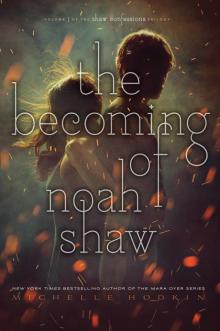 The Becoming of Noah Shaw
The Becoming of Noah Shaw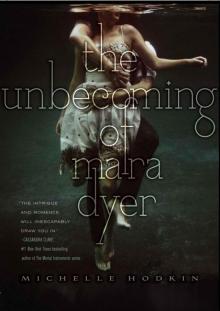 The Unbecoming of Mara Dyer
The Unbecoming of Mara Dyer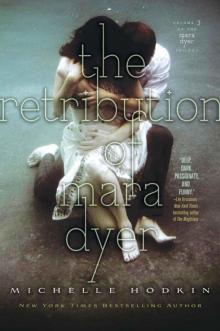 The Retribution of Mara Dyer
The Retribution of Mara Dyer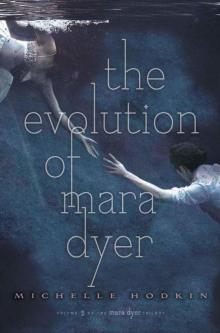 The Evolution of Mara Dyer
The Evolution of Mara Dyer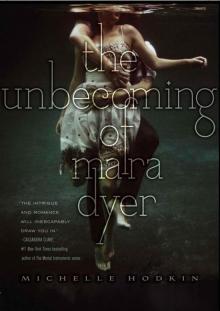 The Unbecoming of Mara Dyer md-1
The Unbecoming of Mara Dyer md-1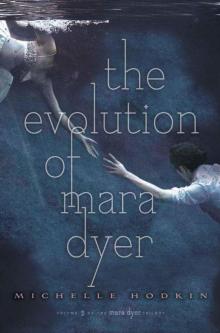 The Evolution of Mara Dyer md-2
The Evolution of Mara Dyer md-2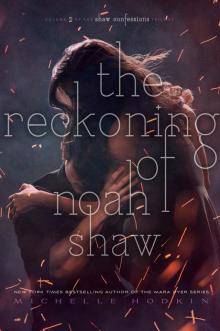 The Reckoning of Noah Shaw
The Reckoning of Noah Shaw